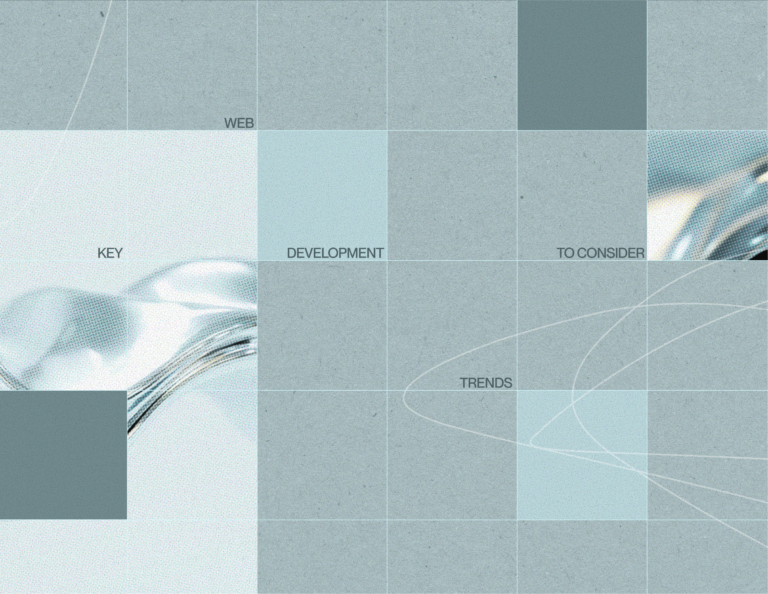Outline:
With Laravel services, building a functional website is a breeze. It is one of the most accessible and powerful tools available, providing developers with loads of functionalities. But what exactly are these functionalities, and how does Laravel differ from the tons of other frameworks on the market?
The growing complexity of development processes calls for a wider range of solutions. What back end development services and tools will be suitable for your website? What are the criteria for the best fitting framework or programming language?
In this new article, we will shed light on Laravel, its peculiarities, and when it’s extremely useful and why. If you are eager to know more, let’s start with its definition.
The Advantages of Using Laravel for Custom Web App Development
Laravel is an open-source PHP framework that helps to create various web applications of different complexity levels. It owes its popularity specifically to its scalability features and functions that take care of most development issues that are challenging to tackle manually, for example, routing or authentication. It reduces the time spent on coding.
Since Laravel allows you to build custom web apps on the basis of PHP, it won’t pose a challenge if you’re already familiar with the language’s peculiarities. Running on PHP, Laravel is server-side rendered and sticks to an MVC (Model-View-Controller) design pattern. This contributes to a faster development process by allowing for parallel development and simple changes without affecting the whole model.
Moreover, it is super easy to customize and scale, allowing developers to create robust and easy-to-support codebases, and alter web applications. Its features include a modular packaging system, easy-to-support codebases, excellent integration and error handling systems, as well as built-in automated testing.
Before diving into Laravel’s functionality, let’s learn more about its history and its evolution over time.
From Artisan to Jetstream: A Timeline of Laravel’s Major Releases
Laravel was created and released in 2011 by Taylor Otwell. Otwell created Laravel to solve issues that Codeigniter couldn’t handle, specifically authentication and authorization. The first version of Laravel addressed these issues, but it didn’t support controllers, which meant it wasn’t a fully fledged MVC framework. The second version, released the same year, added controller support, and established the MVC model in Laravel. However, it lacked some of the third-party packages that developers deemed necessary.
Laravel 3.0, released in 2012, introduced Artisan—a command-line interface—and improved database layout version control, and Bundles, which allows developers to group code into packages.
Laravel 4.0, or Illuminate, released in May 2013, is a complete rework of the previous Laravel versions. Among its new features, the version included support for message queuing, deferred deletion of database records, and sending various types of emails.
Laravel 5.0 was launched in February 2015 and introduced support for scheduling recurring tasks (with a package called Scheduler), an abstraction layer called Flysystem (that allowed utilization of remote storage similarly to local file systems), improved handling of package assets (via Elixir), and simplified external authentication (thanks to Socialite).
Laravel 5.1, released in June 2015, was the first version that received long-term support (LTS).
Laravel 5.3, introduced in August 2016, aimed at improving development speed by adding supplementary ready-made enhancements to common tasks.
Laravel 5.4, released in January 2017, included many new features such as Laravel Dusk (a user-friendly API for automation and testing browsers), Laravel Mix (a flexible API for defining Webpack building steps), Markdown Emails, Blade Components, and Slots (a powerful template engine), Automatic Facades, route enhancements, and more.
Laravel 6.0, launched in September 2019, shifted project code generation, introduced semantic versioning, upgraded authorization responses, job middleware, and lazy collections.
Laravel 7.0, released in March 2020, obtained such features as Laravel Sanctum (authentication alternative), Custom Eloquent Casts, Blade Component Tags, Fluent String Operations, and route model binding improvements.
Laravel 8.0, launched in September 2020, is the latest version of this framework so far. It offers Laravel Jetstream, migration compression, and other features intended to improve usability and user experience.
As of February 2023, Laravel 10.0 is the most recent version of the framework. With updates such as support for PHP version 8.1, an updated application skeleton, and the addition of Laravel Penant, it has become one of the most stable releases among all PHP frameworks currently available.
As you can see, with every release, Laravel has solved different problems and challenges, making the interaction with this framework more convenient and flawless. This constant improvement shows that Laravel is not going to stop improving to provide users with the best service possible.
Why Laravel Excels in Backend Development
The functionality provided by Laravel is primarily related to backend development, which involves building the technical features of an application such as creating user accounts, working with databases, and developing content management systems (CMS). While Laravel can be used to create full-stack applications, its focus is on the backend rather than the frontend.
Unlocking the Power of Laravel: Advantages Every Developer Should Know
With a clear definition of Laravel, let’s explore its main advantages. What makes it special for developers and why should you use it?
Easy to use
One of the significant advantages of Laravel is its comprehensive and easily understandable documentation. This feature allows users of all levels of experience to utilize the full range of functionalities provided by the framework. Users can focus on the logic of the application without worrying about technical issues like databases, tools for caching or storing files, and other similar concerns.
Scalability
Scaling a Laravel application is an easy process. The framework offers several native tools, including Laravel Cache for caching, Laravel Horizon for queuing, and other services like Eloquent that allow users to leverage the power of cloud services. Laravel also includes an opportunity to extend the functionality of the base application by installing packages that are similar to CMS modules.
Performance
Laravel provides high performance for web applications. This feature is achieved through optimized code and caching tools that increase the speed of web page generation. Additionally, Laravel allows caching individual system components (views, routes, configurations, etc.), which reduces the complexity and resource consumption required to generate web pages.
Security
Laravel takes security seriously. It provides incredible security features and functions, such as ORM (Object Relational Mapping) that prevent malicious activities and protect the code from intruders. This feature helps companies protect their resources from hidden SQL injections and cross-website scripting.
Big community
Since Laravel has an open-source code means that any qualified programmer may contribute to its development and modernization. This feature has created a massive community of users who improve the product code and create a vast number of add-ons and modules that solve a wide range of tasks in a relatively short time. The community helps the code stay relevant and viable, and companies can always find specialists for their projects, making it easy to maintain.
Built-in Authentication
Laravel provides a built-in authentication system that is easy to implement and highly secure. This makes it simple for developers to add user authentication and authorization to their applications without having to spend a lot of time on coding.
Modular Structure
Laravel has a modular structure that allows developers to easily add or remove features as needed. This makes it possible to create highly customizable applications that can be tailored to meet specific business requirements.
Easy Database Management
Laravel comes with an easy-to-use database management system that makes it simple to work with databases, run migrations, and seed data.
Unit Testing
Laravel makes it easy to write and run unit tests, ensuring that your application is functioning as expected and helping to catch bugs before they become bigger problems.
Artisan Command Line Interface
Laravel’s built-in command line interface, Artisan, provides developers with a powerful set of tools for managing their applications, running tasks, and automating repetitive tasks.
In conclusion, Laravel has many benefits that make it a popular choice among developers. The advantages mentioned above are just some of the many reasons why you should consider using this framework.
Exploring the Advanced Features of Laravel Framework
The major advantages of Laravel have been covered, and now we can discuss the features that make this framework stand out from the rest.
Authentication is one of the main features that Laravel provides by default. It offers a modern system for user registration and authentication, which can be done through web forms or social media networks. Laravel also includes a module that enables users to reset forgotten passwords or personal information for logging in, which is convenient.
Another powerful tool that Laravel offers is its template engine, Blade. Blade allows developers to use pre-created structural templates, which speeds up the creation of web applications without restricting developers from writing their own code. Blade templates are simple, clear, and effective, while the engine itself is lightweight and doesn’t affect the application’s performance.
Laravel’s database migration system greatly simplifies the process of creating and managing databases, and with its help, programmers can easily share databases with other stakeholders, thus making collaboration more consistent, organized, and smooth. The mapping feature also enables simple maintenance of databases with no need for re-creating them.
Laravel also offers a pre-installed object-relational mapping or ORM, called Eloquent. All the mappings are user-friendly and include a powerful authentication library that provides many useful functions. The framework also provides additional modules that enable developers to make applications more responsive and structured.
Being an advanced framework, Laravel also provides its users with unit testing, which makes it easy to test and debug each module and component individually. This assists in troubleshooting the project and verifying that it lacks any bugs or inconsistencies.
Laravel is also aware of the necessity of a multilingual interface in applications to help companies bring their businesses to the international level. The framework offers a simplified localization system to help users broaden their horizons.
With the Laravel modular packaging system, developers are able to divide everything into several logical areas, which helps maintain the existing code clean and structured and allows the same code to be used or rewritten in the future. This saves time.
Laravel employs caching to optimize application performance, which means that the re-requested content is stored and utilized for subsequent requests and queries. This adds efficiency to the application as it frees users from the need to constantly enter their data, consequently reducing the processing time.
Automatic pagination built into Laravel substantially simplifies page generation by replacing different ways of doing it with a single mechanism. Bundles are the main way of adding new functionality to Laravel, with diverse types of bundles available. Laravel’s Inversion of Control containers is a powerful tool for managing class dependencies, eliminating hard-coded class relationships, and providing more flexibility.
The Laravel file system offers various drivers for interacting with the local file system, providing a convenient and simple way of uploading files locally or in the cloud. Laravel’s Artisan is a command-line interface that enables users to execute a variety of different tasks when developing a web application. Laravel also utilizes Composer, a dependency manager for PHP, that enables developers to manage external packages or libraries and integrate them into their PHP-based projects.
Don’t forget about Blade Components: they are a powerful feature that allows developers to encapsulate reusable parts of the UI into custom HTML tags. This feature helps to reduce duplication and improve the maintainability of the code.
Another brilliant feature is Laravel Telescope: it is a debugging and profiling tool that provides insight into the requests coming into the application, database queries, and more. It helps developers to identify and fix issues quickly.
As you can see, Laravel offers a plethora of various features that are focused on ensuring a highly efficient and convenient process of working with this framework. The list of features is not exhaustive, and there are far more useful tools that any website can benefit from. That is what makes Laravel so popular among users.
Top Laravel Packages for Streamlined Web Development
Having explored key features and tools, let’s take a look at Laravel packages that serve as a way of delivering wide functionality to the websites.
Laravel Passport is the simplest tool for API authentication, thanks to its command line. It provides a complete OAuth2 server implementation for the application. Moreover, it comes with all the required database migration systems, controllers, and routes.
Laravel Scout is open-source software that allows users to add full-text search to their Eloquent models. Furthermore, it is a handy system that is employed for synchronizing search indexes with Eloquent records. It typically goes with the Algolia driver, but users may write their own driver, thus supplementing Scout with an individual search tool.
Laravel Dusk is a package that enables users to test their applications and to see how it works through the eyes of the customers. The testing is carried out in the browser with the help of a specified API. Besides, it is accompanied by Chromedriver and doesn’t require the installation of JDK or Selenium drivers.
Laravel Socialite is a package that ensures a flexible interface for authentication with OAuth providers, such as Twitter, Facebook, Google, and others. Among its characteristics, we’d like to mention its user-friendliness and comprehensiveness since it contains almost everything needed for the implementation of authentication through social networks.
Laravel Cashier is utilized for simplification of billing subscriptions and allows users to avoid possible problems when managing them. It also provides a clear and understandable codebase, simple usage of Stripe (payment service), compatibility with SCA regulations for Europe, etc. Moreover, with its help, companies can smoothly work with coupons, temporary subscriptions, single payments, invoices, and other important elements of e-commerce.
Laravel Envoy is a truly useful free tool for launching tasks with minimalist syntax (in the Blade form, mostly). It may be employed outside the Laravel framework (and even outside PHP) and is easy to configure. It also enables users to run tasks on multiple servers, thus allowing parallel processing. Also, after the task completion, users may receive notifications in Slack or Discord.
Laravel Telescope is a perfect free tool for debugging applications. It helps users to understand the reasons and solutions for arising issues and to track the time required to complete the tasks and commands. Consequently, it significantly simplifies and enlarges the scope of the development process since it offers free access to a huge amount of information.
The range of Laravel packages and tools is growing every year, speeding up the projects’ development process, while the system itself keeps an eye on their quality. With these packages and tools, Laravel provides a complete solution for web application development.
Top Websites Built with Laravel
Once major useful features and tools of Laravel are discovered, it’s time to take a look at the brightest examples of websites that are based on Laravel.
#01 Laracasts
Laracasts is an educational platform specifically designed for web developers. Among its courses, there are those focused on mastering Laravel, PHP, OOP (Object-oriented programming), Mysql Database Design, Vue, unit testing, and others. Consequently, with the help of screencasts provided, students will be able to develop and strengthen their hard skills.
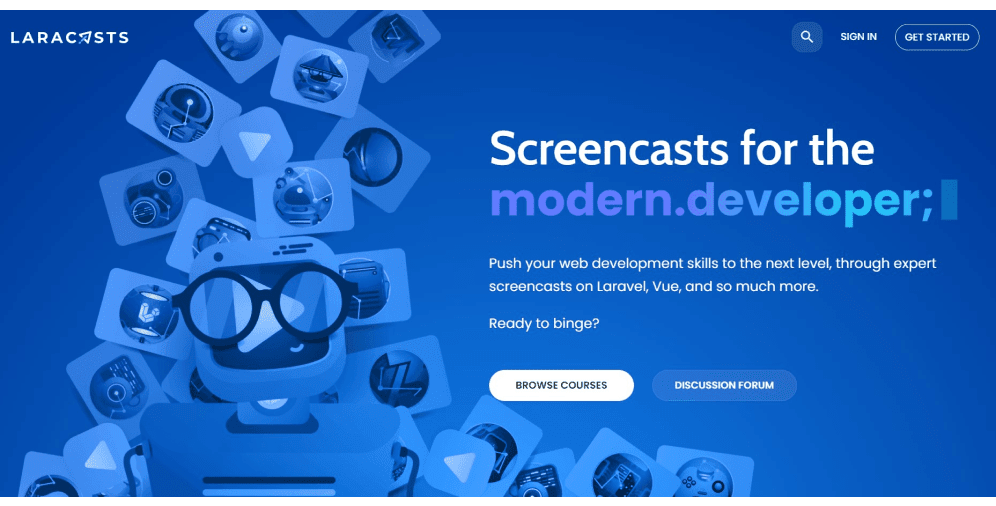
#02 Cachet
Cachet is an open-source service for creating status pages (a good alternative to StatusPage.io, for instance). The service reports the uptime and downtime of the applications and allows users to receive information about any failures or issues. Therefore, companies can track the website elements or functions in terms of their flawless performance and operation in order to promptly fix them.
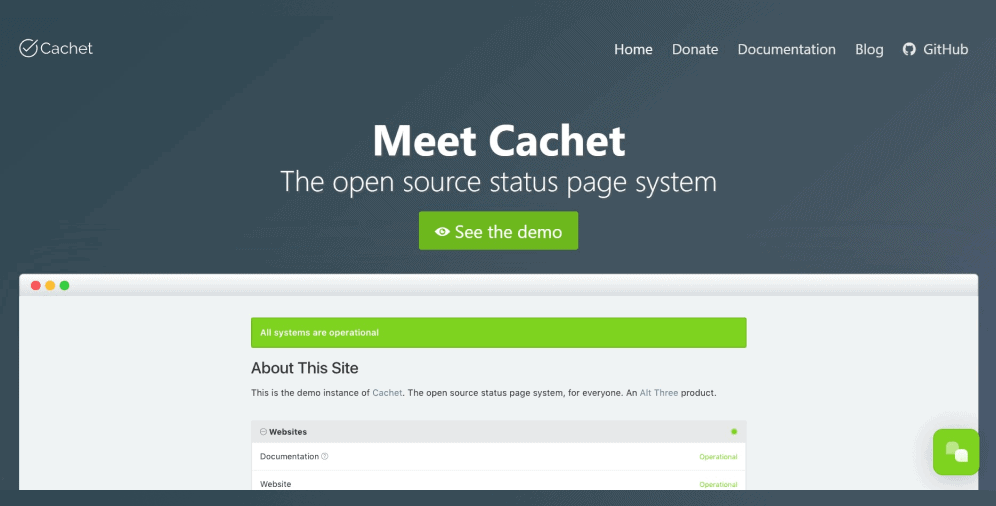
#03 Alison
Alison is a huge online educational platform that is focused on providing professional skills in various spheres and industries. According to its mission, everybody everywhere and at any time should be able to get the education desired. The most important is that the service is absolutely free of charge, thus making the platform truly accessible for everyone.
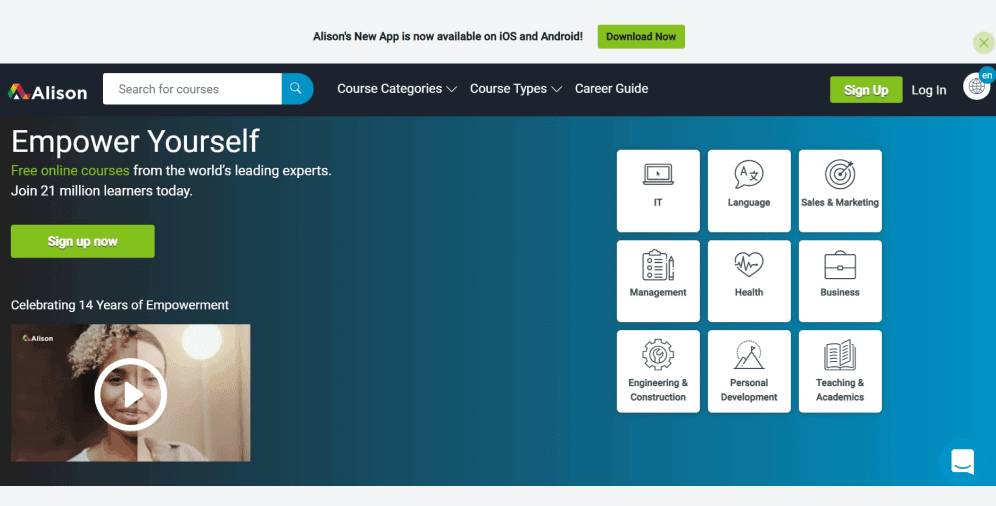
#04 My Rank
My Rank is another E-learning platform that is designed for providing assistance to students (from India mainly) in passing a number of exams such as EAMCET, BITSAT, JIPMER, GATE, and others. Except for granting help from a highly qualified and experienced team of professionals, the platform offers round-the-clock support, effective training materials, and other helpful resources.
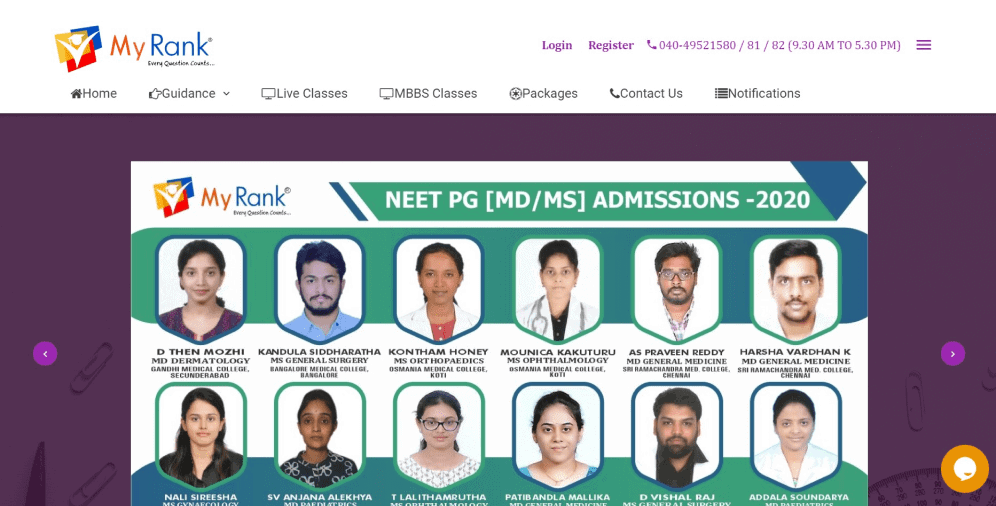
#05 LaravelIO
LaravelIO is the Laravel forum created for users that are eager to discuss the framework or some complications that they face during its employment. This resource is just amazing since all the questions or queries may get competent answers and solutions, thus making the process of interaction with Laravel impeccable as well as convenient.
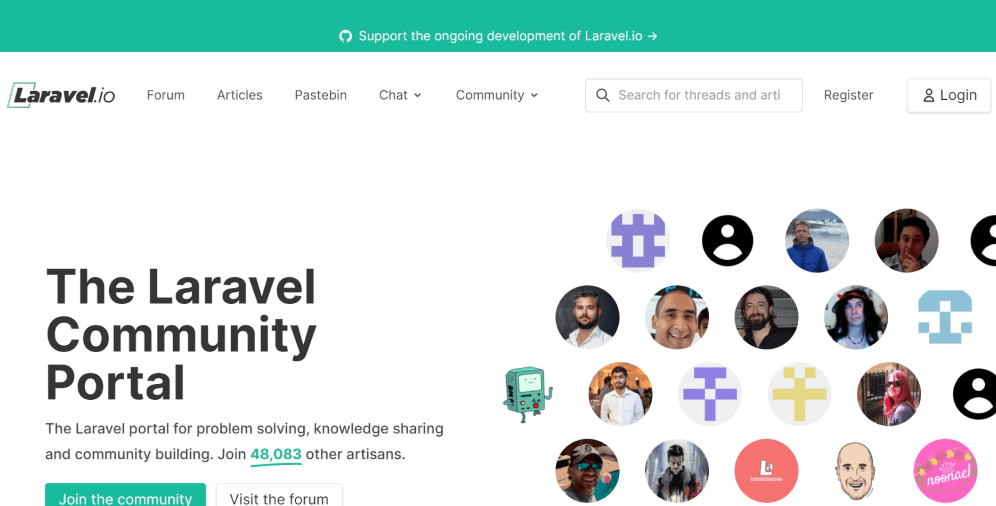
#06 Barchart
Barchart is an excellent platform created to analyze diverse market data. Not just individuals but also investors, funds, media companies, traders, producers of raw materials, and others will find these services highly valuable and useful. Here, the system tracks world stocks, futures, options, Forex, and cryptocurrencies, thus helping interested parties to calculate their profit in advance while getting ready for possible risks.
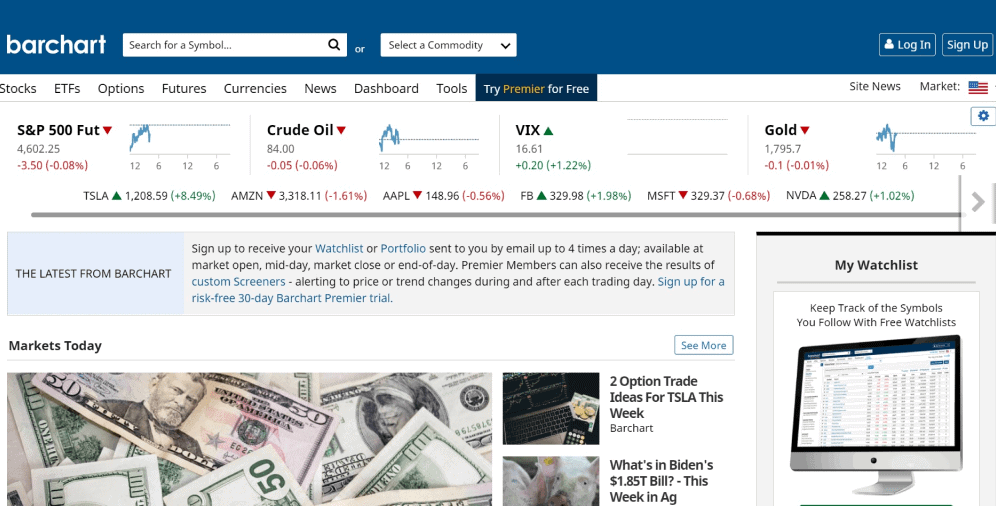
#07 Alphacoders
Alpha Coders is a resource that offers its users millions of images, wallpapers, gifs, and other visual elements of art to be applied to the desktop of various gadgets. Moreover, all images are placed in certain corresponding categories, thus making the process of searching fast and convenient. Accordingly, the website helps people to share and discover new photos and illustrations in different resolutions.
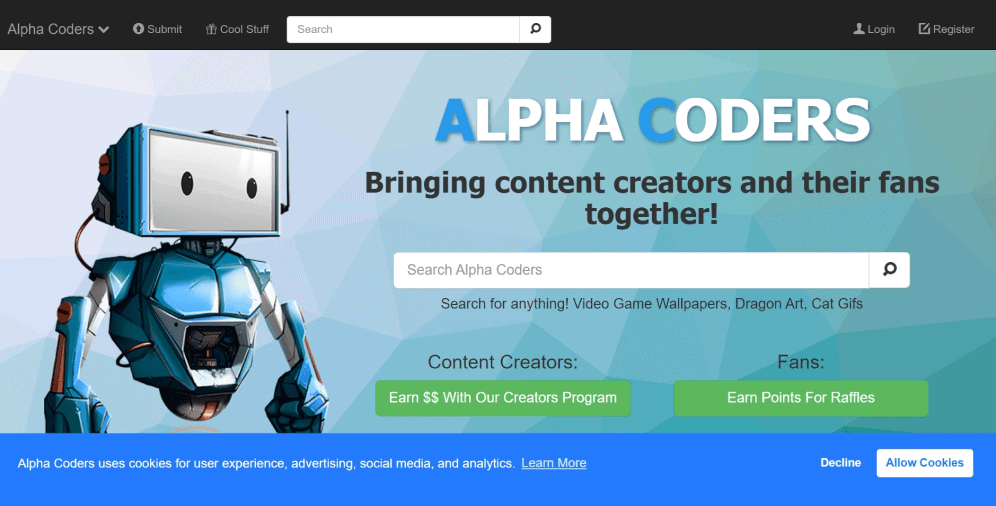
As you can see, the websites built on Laravel are totally different, even when it comes to those that operate in the same field (e-learning, for example). Furthermore, all of them obtain the required functionality and features. And this is another reason for choosing this framework.
On a Final Note
In most cases, while interacting with frameworks, there’s a need for a dedicated specialist who obtains relevant knowledge in website building and development.
Nevertheless, it’s not true for all of them, since when working with Laravel, users can master it easily, and the development process becomes a moment of a masterpiece creation, thus allowing them to stand out and become memorable in the eyes of the customers.
A great number of tools, packages, and features offered by this framework may seem too complex for beginners or non-professionals. However, various guidelines and manuals available serve to make their work smooth and beneficial. Moreover, in case of any questions or doubts, our team of professionals is always at your disposal. Therefore, do not hesitate to contact us.



